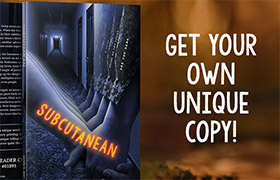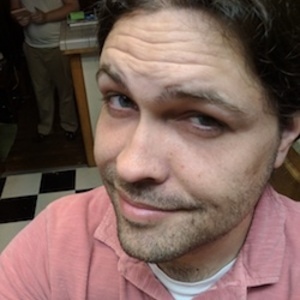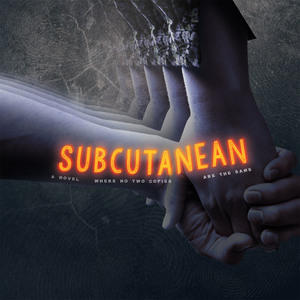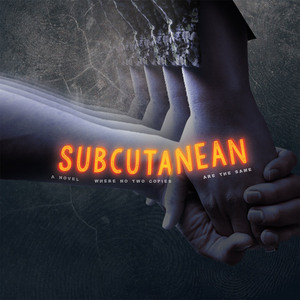I flipped to the other few pages in the folder as the woman twittered on about her sleuthing skills in the county archives. The second page was a short newspaper clipping about the Vortex being shut down—not over a grisly murder or string of disappearances but, of all things, a zoning controversy. A new mayor had apparently instigated a crackdown on businesses operating improperly out of residential districts. There was no date but someone, probably the history lady, had scrawled “1934” in pencil on the photocopy.
The final page was at first a mystery, an article—maybe even older than the Vortex ad—about an old Army post being torn down to make way for new housing. I finally pieced together from a few contextual clues (“the new university”, “on top of the hill”) that this was my neighborhood, and felt a sinking hunch our house was on the site of the old post.
The article briefly recounted the fort’s unstoried history, built on the site of a spring which “bubbled up from a natural cavern” bricked up when the place was constructed. Nothing much of note had ever happened there. Originally built to keep white settlers safe from the natives they were busy exterminating, the post had never been attacked or even threatened.
“Once the fort was built and the spring bricked up, the Indians never again came near the place,” the old article said by way of explanation.
She must have caught me staring at this sentence, because she leaned over and tapped it with a pencil. “Haunted.” Her grin was smug.
“Excuse me?”
“Been seeing spirits, have you?” she asked. “Must be an old burial ground. Read a book about it once. When they’re disturbed, young man, the ghosts of redskins get very angry.”
I looked up at her with a flash of anger. “I think we say Native Americans now. And there’s no ghosts. That’s not it.” I didn’t know how, but I’d never been more sure of anything.
She puckered her mouth, glanced again at my pride bracelet. “Well. Should have realized you’d be the sensitive type.”
I suddenly couldn’t take this any more. Her racist bullshit aside, the notion that what was happening to me was a cute mystery for her to solve was so disconnected from the growing existential dread of the past few days I wanted to slap her. I was unreasonably angry, in fact, considering she’d done me a favor, but in that moment I couldn’t stand her. She was everyone who thought my problems had simple explanations, everything wrong with a world that was broken and couldn’t be bothered to care about fixing itself. For a moment, brief and burning, I hated her.
And that’s when her face came unstuck.
This was back when movies were still celluloid, and at the second-run theater by our house the film would frequently jump the gate, get misaligned. When that happened the image would smear, frames no longer projected neatly one after another but running liquid through the machine, all movement turned into vertical bands of distorted color; and the audio would go juddery, echoey, and distant, vaguely recognizable but distorted. Clipped and monstrous.
This was like that but in three dimensions.
The woman exploded. Her face twisted and smeared, exposing blood and bone. The back of her tongue flapped against her pulsing epiglottis, her eyes round spheres peeling back, turning inside out, her lips hideously deformed and pulled like taffy into a twisting shape that reached from the ceiling to her knees. Her fingers had gone long as tree branches and skinny like pencils, twisting and jerking backward at frantic angles; the pattern of her dress had multiplied and filled the empty spaces in the air and was so thick now I choked on it. Everything moved, everything in her sounded, and the sound was a scream, like her lungs were jet engines, her voice box a bleating thing the size of a cow being flayed alive.
I dropped the teacup and the files: I vaguely remember them tumbling toward the floor in slow motion, spilling and twisting around each other. I was screaming too. All I wanted was to get away. I stumbled back and my head cracked against a cabinet of china plates; I held up my hands to shield myself, as if such a pathetic act could matter against a thing so huge and horrible. It came toward me, moving fast. I couldn’t stop it. My sanity frayed.
And then she snapped back into herself, and her voice returned to normal. Almost. It still juddered, like the floor beneath her vibrated a hundred times a second. And her skin was boiling and rippling, like something inside it was desperate to get out. Thousands of tiny somethings pushing and pounding with disproportionate strength against her wrinkled flesh.
She reached toward me—and maybe this was all in my head, maybe she was trying to help, reacting in shock to my reaction, what must have seemed like some kind of seizure—but as she opened her mouth to speak, the rippling distortions made it into a grin. A huge, horrible, ravenous grin, malevolent. Gleeful.
Her reaching fingers writhed, and her eyes were wide and round as saucers.
I jerked to my feet and ran.
For a while I didn’t even know what direction I was running. I bolted straight through intersections and past oblivious pedestrians, not seeing them. I wasn’t thinking about anything at all. I didn’t stop until a knife in my side brought me up short, bent me double, and I realized then I’d been running a long time.
I collapsed on a patch of hot grass and threw up, retching and gasping. Gnats scribbled the air around me. Somewhere a dog barked.
I stayed there five or ten minutes, my breaths jagged, looking down, studying my hands on the grass and my puke, dealing with those three things, the hands and the grass and the puke, not wanting to look up or able to deal with anything else. Nothing happened. After a while that started to help.
Eventually I climbed to my feet, got my bearings. I realized I knew where I was. I walked slowly back to our house.
I never went back for my bike.
***
When I got home, Niko was gone. I let myself into his bedroom and curled up on his bed, because I needed to be surrounded by something familiar. The smell of him was an anchor to reality. Maybe the only one.
I must have drifted off, because moments later the afternoon light was dying and his hand was on my shoulder, shaking it. I jerked awake, guilty excuses on my lips before I realized he didn’t seem concerned about me breaking in. His hair was matted and he had a distant expression, staring past me.
“I just took a piss,” he said quietly, as if to someone standing behind my left shoulder, “and the bubbles were like eyes. There were thousands of them, floating. Staring. Iridescent, like oil. Something grinning underneath them, though, behind them. Something babbling and grinning and hungry and even when I closed the lid and flushed them away I could still hear them, down there, all of them...”
I sat up, grabbed his shoulders and shook him, then did it again, hard. His head flopped back and he grabbed my wrist, a faint annoyance reaching his face. I was glad to see anything there at all.
I let him focus on me before saying, “There’s no eyes.”
He stared at me.
I shook my head, more sure of it now. “It’s not a thing, out there, stalking us. It is us. We’re what’s wrong here. We’re the ones who don’t belong.” I swallowed, the taste of bile still in the back of my throat. “We’re slipping. Losing our grip on... something. This whole world, maybe. Or it’s losing its grip on us.”
I had his full attention now.
“And I don’t know what happens when we let go, or it does,” I finished. “But I don’t think it’s good.”
He stared at me, hopeless. “There’s no way back.”
“There is. There has to be.” I took a breath. “We just have to find it.”
This is just one way the story can go. In the final version of Subcutanean, no two stories will ever be quite the same. Find out more at https://igg.me/at/subcutanean












Comments (0)
See all